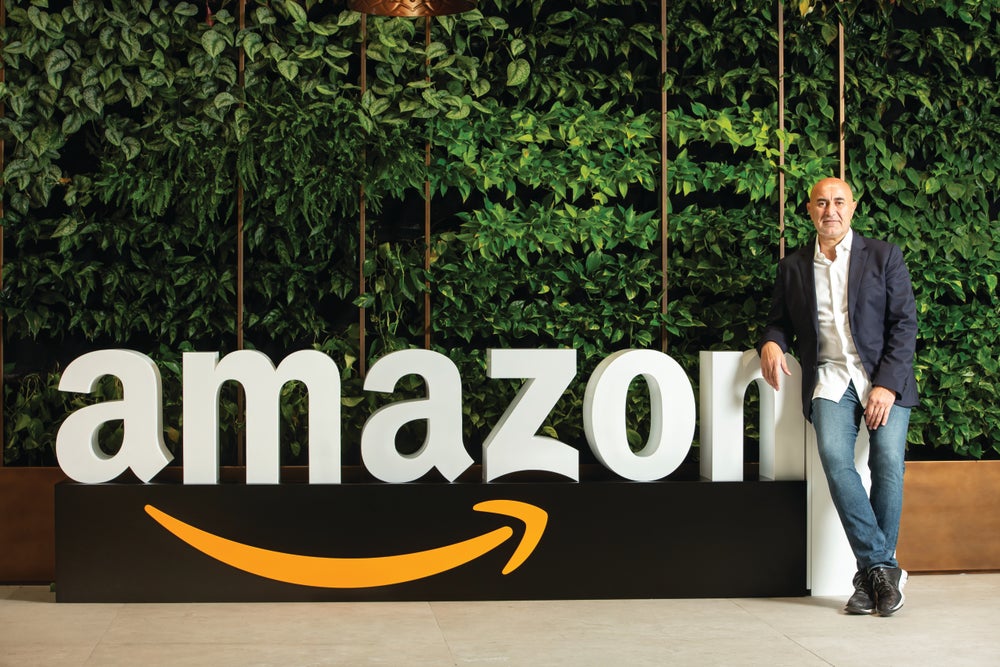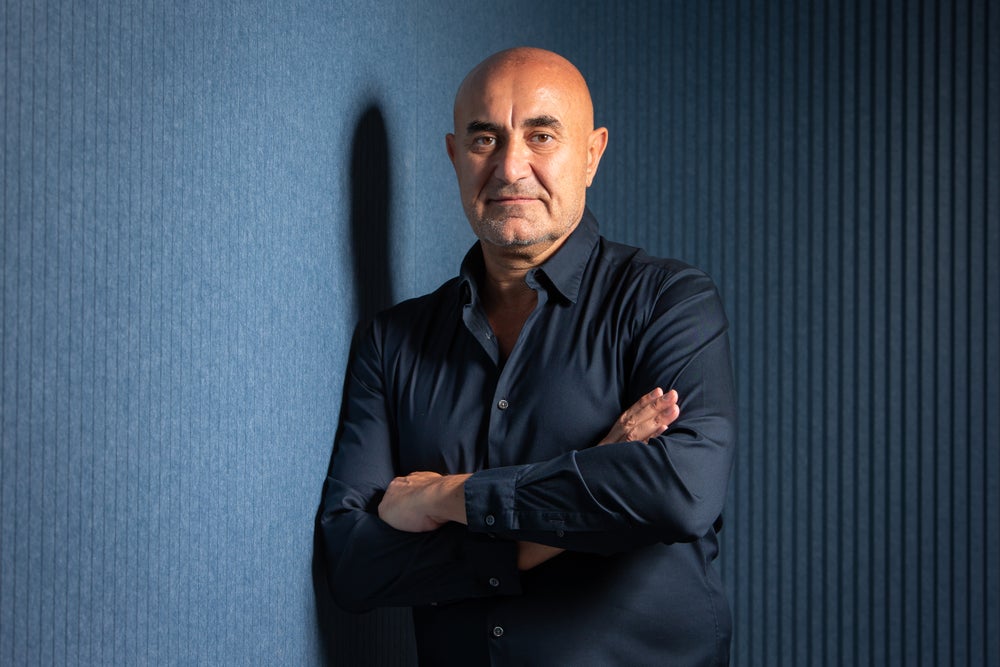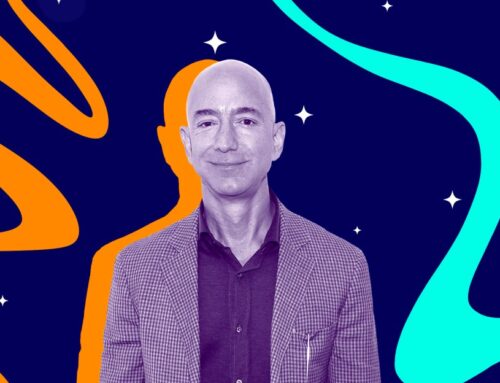It’s Time for Amazon Now: Ronaldo Mouchawar, Vice President, Middle East, Africa, and Türk
November 17, 2025
You’re reading Entrepreneur Middle East, an international franchise of Entrepreneur Media.
Ronaldo Mouchawar once taught aspiring e-commerce entrepreneurs in the Middle East how to wait — for infrastructure to catch up, for payments to move online, and for consumers’ trust to be earned one delivery at a time. Now, he is teaching them how not to.
With the launch of Amazon Now, the first quick commerce service of its kind from Amazon globally, Mouchawar is redefining convenience in a region that has fostered innovation and created the optimal environment for experimentation and growth.
“Initially, when we started doing e-commerce in the region, it was something very new,” Mouchawar explains. “We had to, kind of, pave the way on our own to build these services — we were the innovators. We also had to focus on the early adopters, speaking to smaller businesses about how to come online and start selling. Today, I’d say we’re in the next phase — it’s all about localizing a global service like Amazon.”
Related: The 100: Ronaldo Mouchawar, Vice President, Amazon MENA
The newly-launched Amazon Now is the company’s fastest delivery service to date aimed at delivering everyday essentials to customers in 15 minutes. “Since 2019, when Amazon started operating in the UAE and across the region, we’ve added a wide selection of products, and today customers visit our website for their everyday needs. So, we’ve seen them come back daily to buy whatever they need from the vast range we offer,” Mouchawar says. “Over time, we realized that there are certain products customers want to receive much faster. So, by listening to them, understanding trends, and leveraging technology, we’re now launching this new service – Amazon Now.”
Amazon has introduced two services — a 15-minute delivery for everyday essentials for customers across most major areas in the UAE, and a 2-hour delivery option offering an even wider selection of products across more than 30 categories. It plans to expand to even more locations in the coming months. “Firstly, micro-fulfillment centers located within communities deliver orders in just 10 to 15 minutes — groceries, frozen items, and other everyday essentials,” Mouchawar explains. “We also offer a 2-hour service that delivers a broader selection — clothing, electronics, and home products. It’s a hybrid network — a very fast, quick commerce model that serves many of our Prime customers in major cities, while the two-hour service supports customers everywhere.”
This ultra-fast delivery reinforces Amazon’s commitment to meet the evolving needs of UAE customers. “Customers here really value speed and convenience,” Mouchawar says. “When we first started, Amazon offered one-day delivery. Then we introduced same-day, followed by two-hour delivery — and now, 15 minutes. And we’re doing it across a very large selection of products.”

“Customers also want an easy way to shop through the app and add multiple items quickly, so we’ve launched a dedicated interface for Amazon Now that’s very simple to navigate — almost like walking through the aisles of a grocery store. Because the service is fast, we’ve also built in notifications and tracking, so customers can see their orders coming in real time. The store is available 24/7, so deliveries can happen at any time.” Mouchawar adds, “And finally, customers have the flexibility to pay using debit cards, credit cards, or whatever payment method they prefer in the region. The idea is to deliver greater convenience — ensuring customers turn to us not only for same-day products, which already number in the hundreds of millions, but also for their everyday groceries and essentials.”
Even as Amazon Now promises delivery in as little as 15 minutes, Mouchawar is quick to emphasize that speed never comes at the expense of safety. The company’s delivery teams, he notes, undergo rigorous training, and performance is measured by reliability — not by how fast they drive. “We take safety very seriously,” he says. “Our drivers and fleet associates go through a very rigorous training in terms of how to drive safely. There aren’t KPIs for delivering fast.The speed comes from shorter routes and technology, not from drivers going faster.”
Behind Amazon Now’s promise of near-instant delivery lies a sophisticated layer of artificial intelligence — one that balances precision with safety. As Mouchawar explains, AI isn’t just powering speed; it’s orchestrating every step of the process to protect both customers and drivers. “AI helps us predict what prod- ucts to place in which community, so we look at different neighborhood shops and tailor the selection and assortment accordingly,” Mouchawar says. We also use AI to ensure that our supply chain replenishment and service frequency operate at a much higher level of efficiency — with multiple replenishment cycles per day. AI also helps us to determine optimal product placement across these locations.”
He adds, “And finally, we use AI to predict and fulfill delivery promises. So, if we say 12 minutes, 8 minutes, or 10 minutes — our fastest delivery so far has been just 6 minutes — we make sure it’s achieved safely. That means allowing enough time to pack the order and compute the route in a way that ensures the driver can deliver within the allocated time, without compromising safety.”

Mouchawar has long been known for relying on partnerships and inclusion as a means of driving sustainable growth. That same philosophy endures with the launch of Amazon Now. “For example, we’re partnering with 7X [the new identity of Emirates Post Group] because they already operate within different communities,” he says. “We’re doing the same with petrol stations like ENOC and large grocery groups like Lulu here in the UAE, and Al-Othaim in Saudi Arabia, which is a major grocer. They know their
business best — how to manage their grocery supply, how to provide quality service — while we focus on the technology side: making their products more accessible, helping them grow their customer base, and ensuring that users on our app benefit from the latest technology and the convenience our logistics network provides.”
With a steady stream of major announcements from Amazon Middle East, Africa, and Türkiye under his leadership, it’s easy to forget that Mouchawar is also marking two decades since he first changed the region’s digital landscape. Twenty years after founding Souq.com, he continues to shape how the Middle East shops, innovates, and connects through technology. “I’ve been blessed to be in this region,” he says. “We’ve seen a huge shift in how customers consume content and services — starting from the early days of Arabic content with the Arabic online portal Maktoob, to the rise of digital services driven by mobile phones. Today, with the advancement of quick commerce, customers across the region are fully accustomed to instant delivery, just as they are to regular e-commerce. It all comes from being constantly connected through their phones, with localized services that customers truly love.”
As Mouchawar looks ahead, he sees the next frontier – AI – already taking shape. “We’re going through what feels like the fourth revolution in digital technology. If you think about it — first came the internet and networks, then computers and laptops, followed by the mobile phone,” he says. “Now, with AI, we’re experiencing another major transformation. It’s a technology that’s changing the way we work, making life more convenient and improving the experience for our customers.”
In many ways, Amazon’s evolution mirrors that of the region itself: both are leaning into artificial intelligence as the next great catalyst for innovation and efficiency. “We have different teams at Amazon that are expanding their presence in the region- our cloud-based virtual assistant Amazon Alexa is here; we have our video business with Prime Video, as well as the smart home security devices Amazon Ring. Amazon Web Services (AWS) now operates multiple data centers across the region — in the UAE and Bahrain — and we’re preparing to launch in Saudi Arabia,” Mouchawar explains. “We’re also partnering with strong regional AI initiatives, such as Humain in Saudi Arabia. The region has truly embraced AI, with significant investments being made in this space. We want to be early adopters, to stay at the forefront, and to have a real stake in this technology. There’s a lot happen- ing in the region, and we’re excited to be part of that momentum.”
Across the region, startups and entrepreneurs continue to look to Mouchawar and Amazon as both an inspiration and a potential partner — aspiring to one day supply their innovations, technologies, or products through its vast network. Mouchawar’s advice to them is simple: stay customer-obsessed.
“I would say always focus on your customer — make sure you understand the space you’re in, do it well, do it at scale, and use technology. That way, the chances of your service succeeding and comple- menting what Amazon offers in the region and globally become much higher,” he explains. “We’re very customer- obsessed. We love entrepreneurs who build, who focus on their customers, and who scale their services. We’ve partnered with many in the region — in areas like after-sales and payments. Just this month, I was looking at our data, and more than ten of our sellers are now generating over a million dollars in sales in the region. We’re seeing these smaller, regional entrepreneurs grow — using Amazon’s technology not only to sell locally, but to expand their reach beyond the region as well.”
When Mouchawar was starting out, the region’s entrepreneurial landscape was defined by scarcity — of infrastructure, of investors, and sometimes even of belief. Today, it’s defined by ambition and scale.
“Just to reflect on that — when we started Souq [the e-commerce platform founded by Mouchawar in 2005 that was acquired by Amazon in 2017], Maktoob, and a few of the other early ventures in the digital space, it was mainly the private sector driving investment. We had to travel abroad to raise capital from multiple VCs around the world,” he says. “Today, we’re very fortunate that the region has completely transformed. We now have sovereign funds, fund-of-funds, and governments playing a major role in enabling entrepreneurs and advancing digital services. For entrepreneurs today, instead of having to go overseas and educate investors and banks about the region, there’s now strong access to capital and resources right here at home.”
Looking back at that evolution, Mouchawar offers a perspective only a true pioneer can — and advice for entrepreneurs on where to focus their energy next. “The key is to focus on solving the really big problems that still exist — and there are plenty across different sectors, whether in health, education, fintech, or e-commerce,” he says. “We continue to see opportunities in transportation and other major industries that are ready — or already in the process — to be disrupted by technology. “I think the focus should always be on building services for the region, using technology at scale, and, above all, focusing on your customer. Make sure customers love what you offer. Keep it simple, keep it scalable, and stay consistent in how you apply technology.”
In the end, Mouchawar says the most valuable lesson he has learned over the last 20 years in entrepreneurship isn’t about technology or scale — it’s something more personal: perseverance. “You have to adapt, but you also have to be very stubborn about your mission,” he concludes. “I’ve seen that throughout my journey — from the early days of Souq to the transi- tion from Souq to Amazon, which wasn’t easy at all because we had to bring two companies together. But in doing so, we combined Amazon’s global resources and expertise with everything we had built locally — our logistics, transportation, payments, and delivery networks. The result is a deeply localized service, and we continue to build on that foundation every day.”
Power Minutes: Ronaldo Mouchawar and Wissam Younane Inspire Bold Beginnings
When Entrepreneur Middle East’s Wissam Younance sat down with Ronaldo Mouchawar, the conversation went beyond e-commerce and innovation- it was about courage, perseverance, and the pursuit of purpose.
Wissam Younane: I’m from Lebanon, and you’re from Syria. Today, we both live in the UAE — in Dubai, one of the most vibrant and opportunity-filled cities in the world. How would you encourage Arab dreamers like us who left our home countries at a young age in search of a better future?
Ronaldo Mouchawar: I always start with the word yalla, get going. The hardest thing is the first step, to decide to chase your dreams and get on the journey. That decision usually requires some courage. But not doing it, not chasing your dream, is probably a lot worse than trying it, even if it fails. There is a lot happening in the region. I started my journey by focusing on the internet, Arabic, and then commerce online, and all three have always panned out for us. Today, there are a lot of sectors you can go into and disrupt with technology. So just, yalla.
Wissam Younane: What would you advise entrepreneurs like us in the UAE to focus on going forward?
Ronaldo Mouchawar: Embrace AI — understand its impact and how you can use it to serve your customers and enhance their experience. Today, that’s almost a necessity for anyone developing technology. But beyond that, surround yourself with a strong team. I’ve always made sure to work with people who complement my skills. I’m not great at finance, so I have a really good finance person. I wasn’t the best programmer — I thought I was, until I met someone who was much better. It’s all about surrounding yourself with like-minded people who bring different strengths to the table.
Related: Follow The Leader: Ronaldo Mouchawar, Vice President, Amazon MENA
Search
RECENT PRESS RELEASES
Related Post




